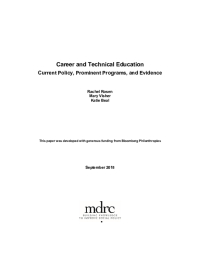Career and Technical Education
Current Policy, Prominent Programs, and Evidence

In late 2017, MDRC was invited by Bloomberg Philanthropies to write a paper detailing the level and rigor of the available evidence supporting career and technical education (CTE).
Interest in the field of CTE has experienced a resurgence over the last decade, as the global economy has grown increasingly competitive while students have continued to leave school underprepared for well-paying twenty-first-century jobs. Together and separately the education and workforce sectors have sought to address these challenges and better prepare students for viable economic futures. The result has been many new, innovative programs at both the high school and postsecondary (college) levels that seek to give students technical training for specific career fields, general training to prepare them for the workplace, and work-based learning opportunities where they can develop connections to employers and the workforce. However, even as CTE programs have grown in popularity, the evidence base to support their reemergence has lagged.
This paper begins with an overview of the issues in the education system and the labor market that led to the current revival of CTE: It argues that the skills today’s employers need are not the ones schools are providing adequately. This section is followed by one describing how various policies have fostered the growth of CTE. The third section of the paper provides detail on the major types of programs and their various components. Specifically, the paper defines what is meant by CTE instruction and training, career pathways, apprenticeships, and career-readiness skills. The evidence section that follows begins by discussing the value of various types of evidence. It then provides a literature review of the available evidence to support each of the program types detailed in the third section, touching on both the amount of evidence available in each area and its level of rigor.
The paper concludes by suggesting that while CTE instruction could bolster students’ economic mobility by helping them gain postsecondary credentials and obtain higher-paying jobs, there are challenges involved in turning that promise into reality. Investments in data and evidence-based practices can give CTE a better chance at success.







